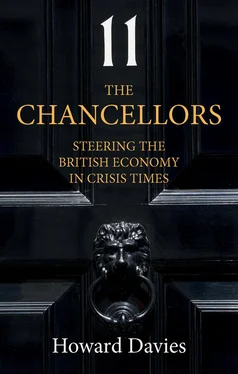In practice, the government has not so far needed to draw on the Ways and Means account, but the question of how the MPC determines the volume of gilts it needs to buy has become a serious preoccupation. The Bank has been criticized for putting its monetary policy tools at the service of the government, and determining the volume of QE by reference to the size of the deficit, rather than to what is needed to meet the inflation target. ‘The real question’, as one commentator put it, ‘is whether fiscal sustainability will begin to encroach on an independent monetary policy committee that targets inflation’. 10
Andrew Bailey, Governor of the Bank since 2020, took to the columns of the Financial Times in April 2020 to reject a direct link between the size of the government’s deficit and the Bank’s bond-buying programme. He denied that the volume of QE was in any way related to what the government is going to borrow: ‘Using monetary financing would damage credibility on controlling inflation by eroding operational independence.’ 11He emphasized that the MPC remains in full control of how and when that expansion is ultimately unwound. Monetary financing of the deficit would be ‘incompatible with the pursuit of an inflation target by an independent central bank’. But as the programme continued, the sceptical voices grew in volume. The FT surveyed the top eighteen buyers of gilts in the London market, and found that ‘the overwhelming majority believe that QE in its current incarnation works by buying enough bonds to mop up the amount the government issues and keep interest rates low’. 12They noted that the monthly volumes of Bank gilt purchases tracked the government’s deficit very closely through 2020 and into 2021. In essence, they argue that fiscal dominance has taken over monetary policy. What is certain is that, at least in the short run, QE allows the government to run a lax fiscal policy without facing interest rate pressure.
The Bank has tried to dismiss that concern. Andy Haldane, then its Chief Economist, argued in November 2020 that:
in the current environment the situation is in some respects the very opposite of fiscal dominance. In the face of a huge shock, fiscal expansion has played an extremely helpful role in supporting demand and in helping the MPC return inflation to its target. What we have seen is better described as fiscal assistance than fiscal dominance when it comes to meeting the inflation target. The externalities from expansionary fiscal policy have in that sense been positive, rather than negative, from a monetary policy perspective. 13
He recognizes that ‘these QE actions have been necessary to support the economy and hit the inflation target. But they pose rising challenges to public understanding of the purposes of QE and, ultimately, perceptions of independence.’ If the market believes, as it seems to do, that QE is driven by the government’s financing needs, then not meeting those expectations could cause yields to rise, which in turn will put further pressure on the government’s finances. The OBR calculated at the time of the March 2021 Budget that a 1% rise in rates would add £22 billion to the government’s deficit.
In those circumstances, would the Bank of England feel able to respond to the prospect of higher inflation with a timely rise in rates? Charles Goodhart of the LSE thinks not. He believes that a combination of ‘massive fiscal and monetary expansion’, on the one hand, and ‘a self-imposed supply shock of immense magnitude’, on the other, will result in ‘a surge in inflation, quite likely more than 5%’. Furthermore, he doubts whether central banks will respond: ‘Inflation will rise considerably above the level of nominal interest rates that our political masters can tolerate.’ 14Haldane also sees that risk. In early 2021 he noted:
There is a tangible risk inflation proves more difficult to tame, requiring monetary policymakers to act more assertively than is currently priced into financial markets. People are right to caution about the risks of central banks acting too conservatively by tightening policy prematurely. But, for me, the greater risk at present is of central bank complacency allowing the inflationary (big) cat out of the bag. 15
In September 2021, the CPI index jumped to 3.2%, requiring the Governor to uncap his pen to explain why the MPC did not plan to react quickly. 16
There have been growing concerns, too, about the accountability framework for QE, and the longer-term risks to the public finances. The Economic Affairs Committee of the House of Lords was particularly trenchant, arguing that ‘the scale and persistence of QE – now equivalent to 40% of GDP – requires significant scrutiny and accountability … The Bank must be more transparent, justify the use of QE and show its working … QE is a serious danger to the long-term health of the public finances. A clear plan on how QE will be unwound is necessary, and this plan must be made public.’ 17
It is impossible to forecast the future course of inflation with any confidence. But it is clear that the future of central bank independence is in more doubt than it has been for twenty-five years. There are many who argue that, in spite of all the benefits in terms of inflation control and a reduction in growth volatility, it may be that peak central bank independence has been reached. 18The risk of fiscal dominance, which now looms largest among the threats, is not the only one. The additional burdens loaded on to central banks, especially in the UK, is another. With its responsibility for prudential supervision of banks, and now insurers too, on top of monetary and macroprudential policies, and a leading role in combating climate change, has the Bank of England become too powerful for its own good? Might the Governor fall into the ‘overmighty citizen’ trap, which enveloped Alan Greenspan in the United States? There is a populist tide which is suspicious of technocratic power, and even their more cerebral political representatives say they have had enough of experts.
In the next chapter I will review the conduct of fiscal policy during the period, but there is an alternative critique of the macroeconomic policy framework which has become more prominent since the financial crisis, and particularly in the Covid pandemic.
That critique maintains that the primacy of the inflation target has already led to suboptimal economic performance, and could seriously hinder further recovery. Simon Wren-Lewis of Oxford University, for example, has argued that ‘to continue with inflation as the primary target could jeopardise a macroeconomic policy that focuses on strong growth, and quickly offsets any negative shocks’. 19He notes that the Fed’s dual mandate allows it to prioritize maximum unemployment and look through temporary increases in inflation. Indeed, the Fed has recently reviewed its approach to the target and declared that in future it will adopt an ‘averaging’ methodology, which allows it to tolerate overshoots to ‘catch up’ with past shortfalls.
Presenting the new policy, Jerome Powell, chair of the Fed since 2018, noted that, in an environment where inflation expectations are very low, interest rates ‘decline in tandem’. As a result, ‘we would have less scope to cut interest rates to boost unemployment during an economic downturn, further diminishing our capacity to stabilize the economy through cutting interest rates. We have seen this adverse dynamic play out in other major economies.’ To prevent such a dynamic establishing itself in the US, the Fed decided that in future ‘employment can run at or above real-time estimates of its maximum level without causing concern’ and ‘following periods when inflation has been running below 2 percent, appropriate monetary policy will likely aim to achieve inflation moderately above 2 percent for some time’. 20
Читать дальше









